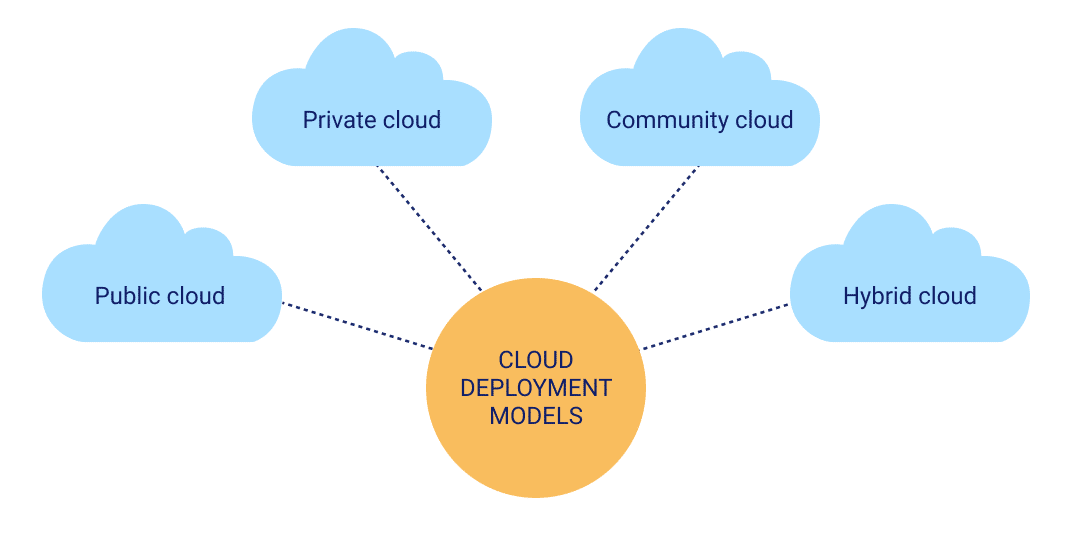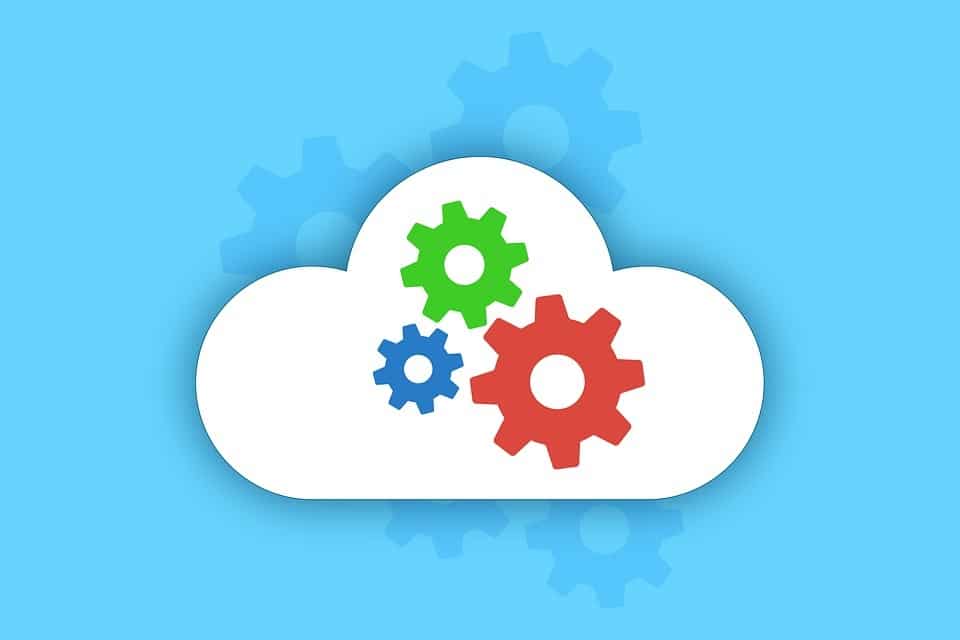Guide to Cloud Deployment Models

What Is A Cloud Deployment Model? Different types of cloud deployment models work as a virtual computing environment depending on who has access to the cloud infrastructure and how much data you want to store.
Types of Cloud Deployment Models
There are different types of cloud deployment models. Each cloud deployment model offers a specific value to your business. By understanding the advantages of the public, private, hybrid, and community cloud, you can capitalize on your ROI and optimize your workload placement. The cloud computing deployment models include:
- Public cloud
- Private cloud
- Hybrid cloud
- Community cloud

Types
There are different types of cloud deployment models. Each cloud deployment model offers a specific value to your business. By understanding the advantages of the public, private, hybrid, and community cloud, you can capitalize on your ROI and optimize your workload placement. The cloud computing deployment models include:
- Public cloud
- Private cloud
- Hybrid cloud
- Community cloud
Public Cloud
The public cloud deployment model, as the name suggests, is accessible by the public. A public cloud deployment model is great for companies that have low-security concerns.
A public cloud is also great for companies that have fluctuating demands. The storage and the sensitive data on this cloud service are available on the public internet.
Although a public deployment is suitable for most uses, migrating mission-critical, sensitive, or proprietary data into any cloud environment that is not designed and certified for handling such data introduces high risk. Companies should first choose deployment models and then make sure that sufficient security controls are in place. These actions should be followed by data encryption. Data privacy is definitely at risk if the data is stored on the cloud unencrypted. There is the risk for unauthorized access either by an intruder who gained access to the infrastructure from outside or a spite employee on the cloud service provider. It would help if you also did a reasonable risk assessment on data retention. Data residues may expose sensitive data to unauthorized parties when the data is removed or migrated by the cloud customer or provider. Also, different countries have different regulations when it comes to data privacy. It is essential to consider the regulatory and legal requirements about where the data can be stored since some public cloud providers don’t offer information about the location of the data.
Another thing to keep in mind is that public environments have a shared nature, which increases security risks, such as unauthorized data viewing by other customers that use the same hardware platform. It would help if you also made a risk assessment on the visibility and control. Customers have restricted visibility and control over the cloud resource because the one responsible for administering the infrastructure is the cloud provider. The lack of transparency introduces additional security concerns. When it comes to the public model, as the control of the IT infrastructure is surrendered by the customers to an external party, customers need to rethink the way they operate. The last thing is security responsibility since the user and the vendor share responsibility in the cloud to secure the environment. Depending on the adopted model, the amount of responsibility held by each of the parties can change.
Pros Of The Public Cloud
There is a minimal investment with the public cloud since the public cloud doesn’t require a significant upfront cost. The public clouds don’t need an in-house team to utilize the public cloud since they don’t have cloud infrastructure management. The public clouds also don’t have a hardware setup.

Limitations To The Private Cloud
The private cloud is pricier since you will need to pay for staff training, hardware, and software. So, the investment for the private cloud is more significant than the public cloud. Because the private cloud is managed in-house, it also means that private clouds are more high maintenance. You will be able to scale in a specific direction with private clouds according to the choice of the hardware.
Hybrid Cloud
The hybrid cloud is a combination of public and private cloud. The two clouds are a part of the same architecture, but they function differently.
Pros Of The Hybrid Cloud
This public private hybrid is an ideal data center for storage for privacy concerns and security and privacy. The chance of data theft is significantly decreased since the sensitive data is segmented, so you don’t need to worry about security and privacy. The hybrid cloud deployment model is also cost-effective since it stores the data in the public cloud.
Limitations To The Hybrid Cloud
The hybrid cloud deployment model has the following limitation: since it needs to integrate one or two cloud service models, the hybrid cloud is pretty complex for setting up.
Community Cloud
The community cloud functions in a way that is similar to the public cloud. A third-party vendor manages this type of cloud deployment model, or it is hosted internally.
Whereas the private cloud server is owned by only one company, the community cloud is used by several organizations with similar backgrounds that share related resources and the cloud infrastructure. If all of the organizations participating in the cloud have consistent performance, privacy, and security requirements, this data center with multi tenants helps these organizations enhance their efficiency. A centralized cloud facilitates project management, implementation, and development, and all of the users share the costs for the system.
An excellent example of a community cloud is where several government departments perform transactions with one another, and they have their processing systems on shared infrastructure. This setup reduces their data traffic, and it also makes it cost-effective to the tenants that are a part of the community cloud.
Pros Of The Community Cloud
This cloud deployment model is much cheaper than the public and private cloud, and it has excellent performance. If you’re interested in Cloud server prices, make sure you read some of our articles. This cloud is a much more affordable option than the other three because several organizations or companies share it. Thus the cost of it is reduced.
Limitations Of The Community Cloud
The limitations of the community cloud deployment models include: the cloud resources are shared due to limited storage capacity and bandwidth, so they often can pose challenges. Also, cloud services are not as popular since the model was recently introduced. Hence, this type of cloud service is not available across industries, and it is not as popular.
If you’re interested in Cloud Server pricing, make sure you read more about it!
Service models
The term cloud deployment refers to the enablement of IaaS (infrastructure as a service), SaaS (software as a service), or PaaS (platform as a service) solutions that may be accessed on demand by consumers and end customers. You can render several services through cloud computing, which can be defined according to the user companies, service providers, and roles. The cloud service models through cloud computing are the following:
Service IAAS
IAAS, or The Infrastructure As A Service, means using the power of physical infrastructure of IT from a third-party provider (servers, storage, and network). With this cloud provider, users can access the IT resources through an internet connection since the resources are held on external servers.
The benefits of this service provider are: there’s no need to install and maintain the IT hardware in-house, so you’ll be able to save money and time, and also, you have remote resource management and access.
This is the best choice for organizations, enterprises, and large accounts to manage and set up their own IT platforms.
Service PAAS
PAAS, or Platform As A Service, allows outsourcing software and hardware infrastructure, including runtimes, integration layers, databases, and more.
The benefits of this service provider are: that you control the backup, protection, and distribution of data. Also, there’s no need to manage the implementation of the platform, which saves you time and provides you with flexibility. You can focus on development by mastering the development and installation of software applications.
This cloud provider is great for those who want to maintain control over their business applications.
Service SAAS
SAAS, or Software As A Service, is a service that does not require any previous installation and is provided through the internet.
This cloud provider is applicable and suitable for most companies.
The benefits of this cloud service provider are: there’s no software maintenance or installation, so you are entirely free from the aligning software environment and infrastructure management. Besides infrastructure management, it also allows quick and easy testing of new software solutions and you benefit from automatic updates with the guarantee that all of the users have the same software version.
Regardless of whether or not a SaaS solution is deployed in public, private, hybrid, or community cloud, many SaaS solutions provide automatic deployment for the cloud services that are being delivered. SaaS deployment offers many extra benefits over the traditional model, for instance, scalability, where application users can be subtracted or added on-demand without having any concerns over capital investments in additional software or hardware. Also, compared to on-premise software deployment, SaaS provides above-average up-time for enterprise applications.
How do you make the right choice when picking a deployment model? There isn’t an approach that will suit everyone, but you should consider a few things before making the decision. Consider what type of support your application requires, and make sure that you assess your needs. It would help if you also thought about what your business goals are. What is your business trying to achieve? Also, take into consideration the possibility that your requirements might change over time.
One of the factors you should consider is how easy it is to use the deployment model. Are you trained and savvy with your computing resources? Do you have the funds to put them through training?
Another thing to think about when you choose a deployment model is the cost. You need to figure out how much you are willing to spend on a deployment model. How much can you pay for updates, maintenance, subscription, and much more? Are you ready to pay any of this money upfront?
The next factor is scalability. Think about your current status and if your system runs into high demand. Another factor to consider is compliance; are there any regulations or specific laws in your state that could potentially impact the implementation? What are some of the industry standards that you need to respect? The last factor you should think about is privacy, and more specifically, are there any strict rules that you’ve set for the data you gather?
Each different cloud service has its perks that can add to the value of your company. A public cloud is an ideal solution for a Cloud Server for small businesses and medium businesses. Since the requirements may change over time, you may try out different models since a different cloud model may work better for you.
Was this page helpful?

